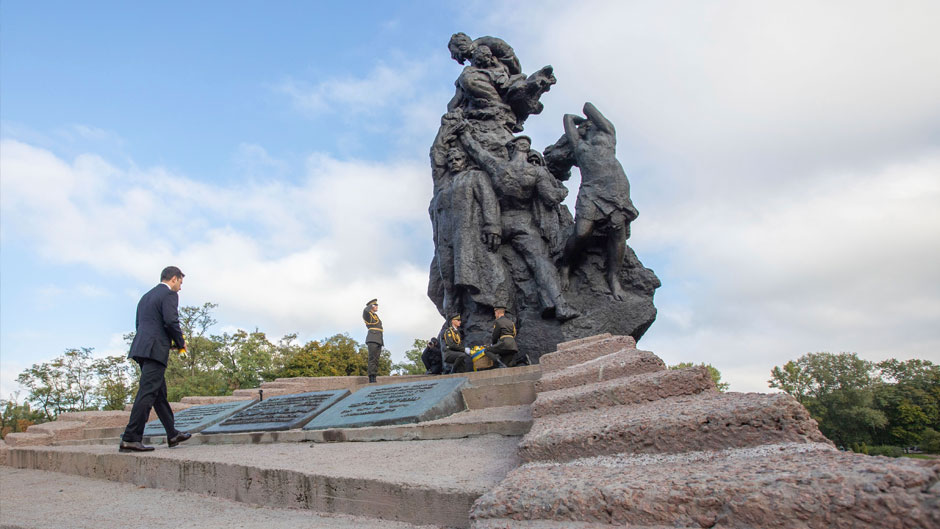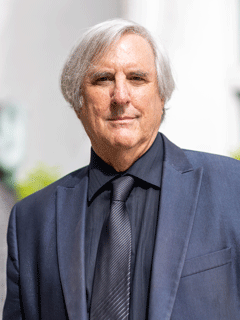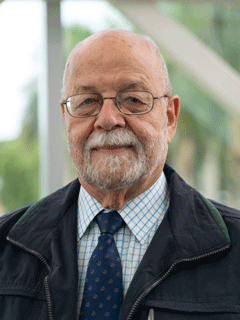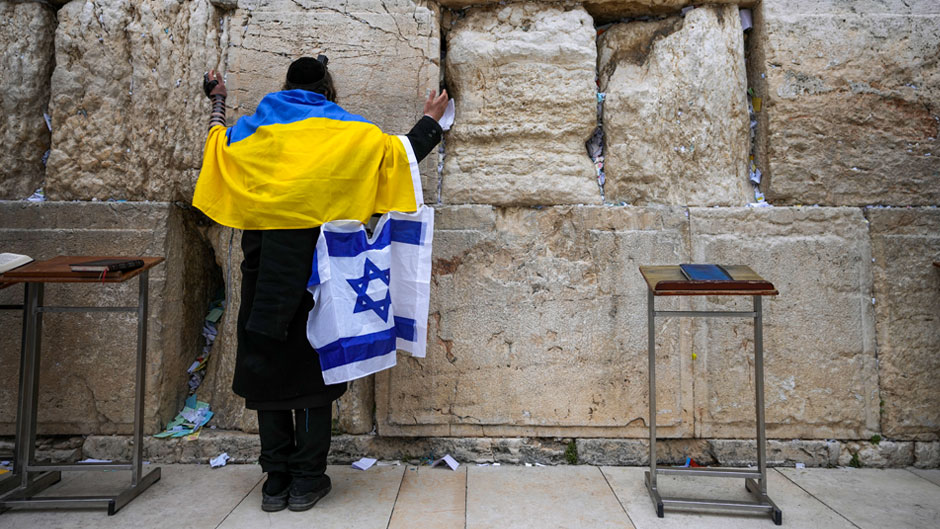Last week, amid a barrage of air raids and gunfire from the Russian army, Ukrainian President Volodymyr Zelenskyy made a unique appeal to his own cultural community. It is a tiny fraction of people who know the danger of leaving a world leader unchecked—the Jewish population.
Zelenskyy felt particularly compelled after a Russian bomb fell next to a Holocaust memorial built near the site of Babi Yar, outside Kyiv, Ukraine, where 33,771 Jews were shot and fell into a mass grave within two days during World War II.
“I call now on all the Jews of the world—do you not see what is happening here? This is why it's important for millions of Jews around the world not to stay silent in the face of such sights. Because Nazism was born in silence," Zelenskyy wrote in Hebrew on the messaging service called Telegram, according to news outlets.

In doing so, Zelenskyy, who is also Ukraine’s first Jewish president, publicly identified with his background. He did it in a place where, for decades, most forms of religion were barred. And before that, identifying oneself as Jewish meant a person could be targeted by violent anti-Semitic attacks.
University of Miami junior Elizabeth Fridman’s Ukrainian parents fled Kyiv in the 1990s because they were tired of hiding their Jewish religion. The tipping point came when they felt forced to baptize their first son in the Orthodox Christian church.
“They sought out religious asylum here in the United States,” said Fridman. “They packed whatever they could and migrated here with a one-way plane ticket and $100.”
Zelenskyy represents a growing acceptance of other religious beliefs in Ukraine that comes from the government. And Fridman, like many other Jews, finds comfort in the fact that the Ukrainian president is Jewish because it shows just how far the nation of Ukraine has come.
“He understands everything that we have been through in the past,” said Fridman. “As Jewish people, we are fighters. So, I know he is going to fight for Ukraine.”

The nation’s previous prime minister, Vlodymyr Groysman, also was Jewish. That is why Russian president Vladimir Putin’s claim that he invaded Ukraine to rid the nation of Neo-Nazis is so puzzling, stated Ira Sheskin, professor of geography and sustainable development, as well as director of the Jewish Demography Project at the Sue and Leonard Miller Center for Contemporary Judaic Studies, which tracks the population of Jews locally and internationally.
However, Sheskin and Haim Shaked, founding director of the Miller Center for Contemporary Judaic Studies at the University, said that language was simply used to convince Russians to support Putin’s decision to take over Ukraine. Shaked, who was born in Israel, said that people use the word Nazi so freely today that, unfortunately, its reference to horrific actions of the German political party perpetrated from 1933 through 1945, is getting lost.
“Attaching the term Nazi to everything dilutes what the Nazis were all about, and it takes a very important historical term and deems it meaningless,” said Shaked, who is also a professor of international relations. “Putin’s use of it has nothing to do with the current Ukraine, but it’s a term that resonates with his own people because the horrors of the Second World War are embedded in the Russian collective memory. So, when he says we’re doing a denazification of Ukraine, it means Russia is good and Ukrainians are evil.”

Still, to understand this war of words—and why these opposing leaders are both referring to the Holocaust, when 6 million Jews were killed by the German soldiers and their collaborators—both scholars said that the public needs to understand the nation’s complex religious past.
Painful past
Despite Ukraine’s current state, where most Jews can live and practice their religion somewhat freely, antisemitism has a long history in Eastern Europe, said Sheskin and Shaked. In the mid-1600s, Cossack leader Bohdan Khmelnytsky came to power, and is still revered because he fought to free Ukraine from Polish rule and establish its independence. However, Khmelnytsky often blamed the Jews for his shortcomings and his regime murdered tens of thousands of them.
Later, in Odessa, a port city in southern Ukraine, the first “pogrom” occurred in 1820, where Jews were the target of violent attacks from non-Jewish populations in Russia and Ukraine. An increasing number of pogroms across Ukraine and Russia prompted thousands of Jews to flee the region for the United States in the late 1800s.
“There were less than 5,000 Jews in the United States before 1840 but starting in the 1880s and through World War I, lots of Jews came from Eastern Europe, including Ukraine, Poland, Moldova, and Hungary,” Sheskin said. “And the vast majority of American Jews—which is about 7.3 million [people] today—can trace their roots to the former Soviet Union.”
In the 20th century, Soviet Union leader Joseph Stalin, who ruled over Ukraine starting in 1928, enforced socialism and, later, communism, which discouraged any form of religion in Ukraine and Russia until 1991.
Yet, before World War II began in 1939, Eastern Europe was still home to millions of Jews.
“Ukraine and Poland were the two biggest centers of Jewry before the Holocaust,” Sheskin said. “There are a lot of reasons why American Jews feel a closeness to Ukraine now.”
Novel future
Today, Ukraine is home to about 45,000 “practicing” Jews, according to the latest American Jewish Year Book, which Sheskin edits with Arnold Dashefsky, a professor from the University of Connecticut. However, Sheskin pointed out that if you count the number of Ukrainians with one Jewish parent, the numbers rise to 90,000, and if you count those with one Jewish grandparent, there are 200,000 Jews in the country.
In a nation of 41 million people, Jews still represent a small minority in Ukraine. “It’s the only other country than Israel to have a Jewish head of state, and since Jews are only 0.2 percent of the world’s population, that’s pretty remarkable,” Sheskin noted.
Many of the Jews who did survive the Holocaust in Ukraine and Russia later emigrated to Israel, which was declared a state in 1948. But few know that many of those founding members of Israel hailed from the Ukrainian port city of Odessa, which still has a vibrant Jewish community, according to Shaked. In addition, Golda Meir, Israel’s fourth prime minister, was born in Kyiv, Ukraine. And Hasidism, a sect of Orthodox Judaism, regards the Ukrainian city of Uman as a sacred site.
About 15 percent of Israelis today report that they came from the former Soviet Union and that they or their parents arrived in Israel after 1967. Even larger numbers have grandparents or great grandparents from the old Soviet Union, Sheskin said. This may explain the close relationship between the three nations today, and it may be why Israeli prime minister Naftali Bennett is trying to foster peace talks between Ukraine and Russia.
Cities like Kyiv, Dnipro, Odessa, and Kharkiv are home to the largest Jewish communities in Ukraine today, Sheskin indicated. But they are just as vulnerable to the Russian army. The Hillel House in Kharkiv, along with the Or Avner Jewish Day School, was hit with Russian rockets last week. Meanwhile, Ukrainians of all faiths were sheltering in the Synagogue of the Breslover Hasidim in Uman.
The fact that Zelenskyy is leading a nation that has managed to hold some of the Russian troops at bay, while the 44-year-old politician urges the rest of the world to protect Ukrainians so fervently, has prompted an outpouring of support from Jews worldwide who want to help the besieged nation.
“It has made Jews really proud that we have a Jewish president of Ukraine, when in fact this was an area of intense antisemitism, and it was practically a Jewish graveyard after World War II,” Sheskin said. “While Zelenskyy may not be a religious Jew, he is clearly wearing his Jewish identity on his sleeve and is making Jews throughout the world proud.”
For those who want to donate toward humanitarian aid to Ukraine, Shaked and Sheskin recommend the Greater Miami Jewish Federation’s Ukraine Emergency Fund.

